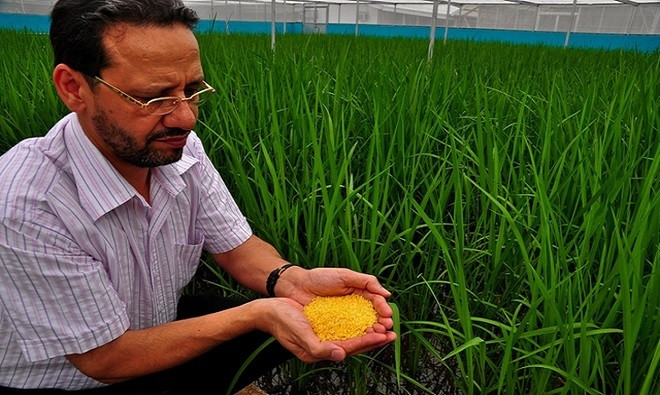The most common genetically modified foods
Tomatoes, corn, soybeans are among the most commonly used genetically modified plants today.

Tomato is the first genetically modified food to be widely used in the United States.In 1994, scientists created the Flavr Savr tomato with an inactivated gene that made the plant not produce polygalacturonaza, an enzyme that triggered the rot of tomatoes.But due to fears that genetically modified tomatoes could cause cancer, the plant has not been grown since 1998, according to How Stuff Works.(Photo: Kamdora).

The ring spot virus is a major problem for the papaya industry in Hawaii, USA. In the 1980s, people began experimenting with a papaya modified to resist this virus strain. After that, they switched to commercial cultivation in 1999. Currently, genetically modified papaya is licensed for use in the US and Canada while the European Union (EU) has not yet allowed its use.(Photo: Juicing For Health).

Rice is the main food crop for more than half of the world's population.Therefore, keeping the rice crops of the world healthy contributes to preventing food crisis.China is now the leading country in the field of genetically modified rice, to create new rice varieties that are resistant to pests, drought, and salinity.Although a pest-resistant rice variety has been approved in the US, farmers have not used it for cultivation.(Photo: Kristen Michaelis).

In addition to being a food for humans, most potatoes are used for other purposes such as feeding for animals, providing raw materials in the form of starch or alcohol processing.Currently, about 10% of potatoes in US food stores are genetically modified potatoes.Genetically modified potatoes may also appear in processed products containing potatoes.(Photo: Atli Arnarson).

America is the world's largest corn producer. In 2000, the US Department of Agriculture estimated that about 25% of corn varieties grown in this country are genetically modified plants. One of the biggest dangers of genetically modified corn is that they are able to pollinate by wind, damaging normal maize varieties grown in nearby fields.(Photo: Fotolia).

Soybeans are the most genetically modified plant of all crops, aiming to increase resistance to insects and fungi, enriching vitamins, fat and protein content.In 2007, more than half of the world's soybeans were genetically modified crops.(Photo: Danielle Menke).

rBGH is a recombinant cow growth hormone .This hormone is synthesized from genetically modified bacteria.After injecting the cow, it will help the animal produce more milk by keeping the milk-producing cells longer than usual.The use of rBGH is banned in the European Union (EU) and Australia, but licensed for use in the United States.(Photo: Farming America).

In western Canada, about 80% of rapeseed is a genetically modified crop.They are resistant to certain herbicides.This helps farmers control weeds more easily, using less pesticides, increasing crop yields.(Photo: Alamy).

One of the most recent genetically modified crops is sugar beet .In 2008, people began to produce genetically modified sugar beets.However, in 2010, this action was banned due to some environmental impact reports.Beetroots usually grow very slowly, thus breeding this genetically modified radish to promote their growth.

Melon is genetically altered because they are especially sensitive to some viruses that cause disease.Scientists are concerned that genetically engineered squash may be growing rapidly in some areas outside of controlled areas because this can cause serious environmental problems.

Salmon is genetically modified for business purposes.This fish is only kept on farms, grows faster and has twice the size of natural fish.Experts say this will help protect the environment and protect wild salmon.Many people wonder if these genetically modified products have negative effects on human health and environmental safety, especially long-term effects?Currently, the answer is still unclear.However, you should also note and limit the use of these foods.
- How to identify GMO genetically modified foods
- Things you should know about GMO genetically modified foods
- Using genetically modified foods is prone to cancer
- Genetically modified plants still cause doubts
- Genetically modified bananas are about to be tested on Americans
- Genetically modified food in Vietnam ever since?
- Genetically modified salmon in the US is controversial
- Genetically modified insects threaten genetically modified plants
- He called on the EU to approve genetically modified corn by voting
- Legislation of genetically modified corn harmful
- Countering genetically modified corn causes cancer in mice
- Raising awareness about genetically modified organisms
 Green tea cleans teeth better than mouthwash?
Green tea cleans teeth better than mouthwash? Death kiss: This is why you should not let anyone kiss your baby's lips
Death kiss: This is why you should not let anyone kiss your baby's lips What is salmonellosis?
What is salmonellosis? Caution should be exercised when using aloe vera through eating and drinking
Caution should be exercised when using aloe vera through eating and drinking